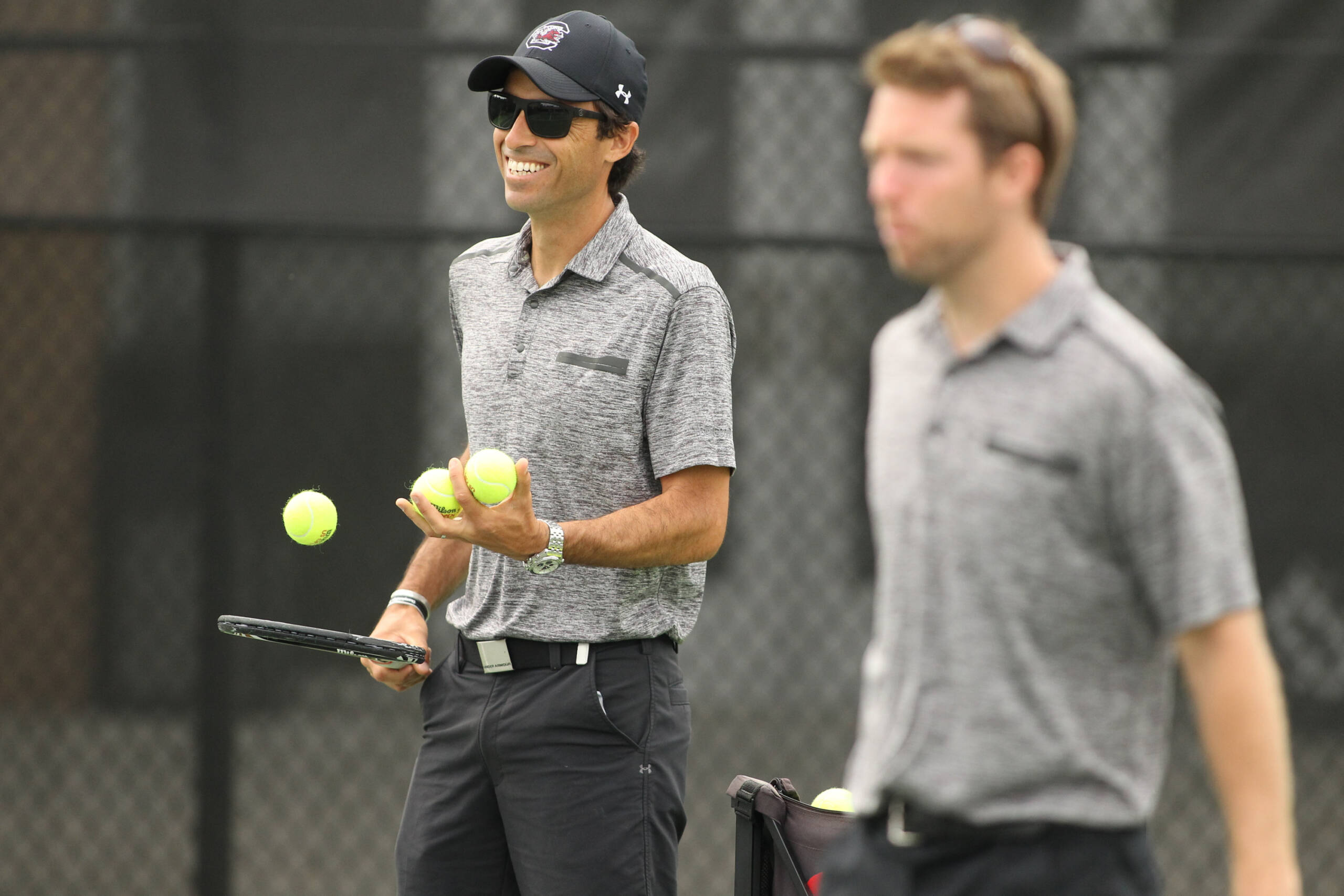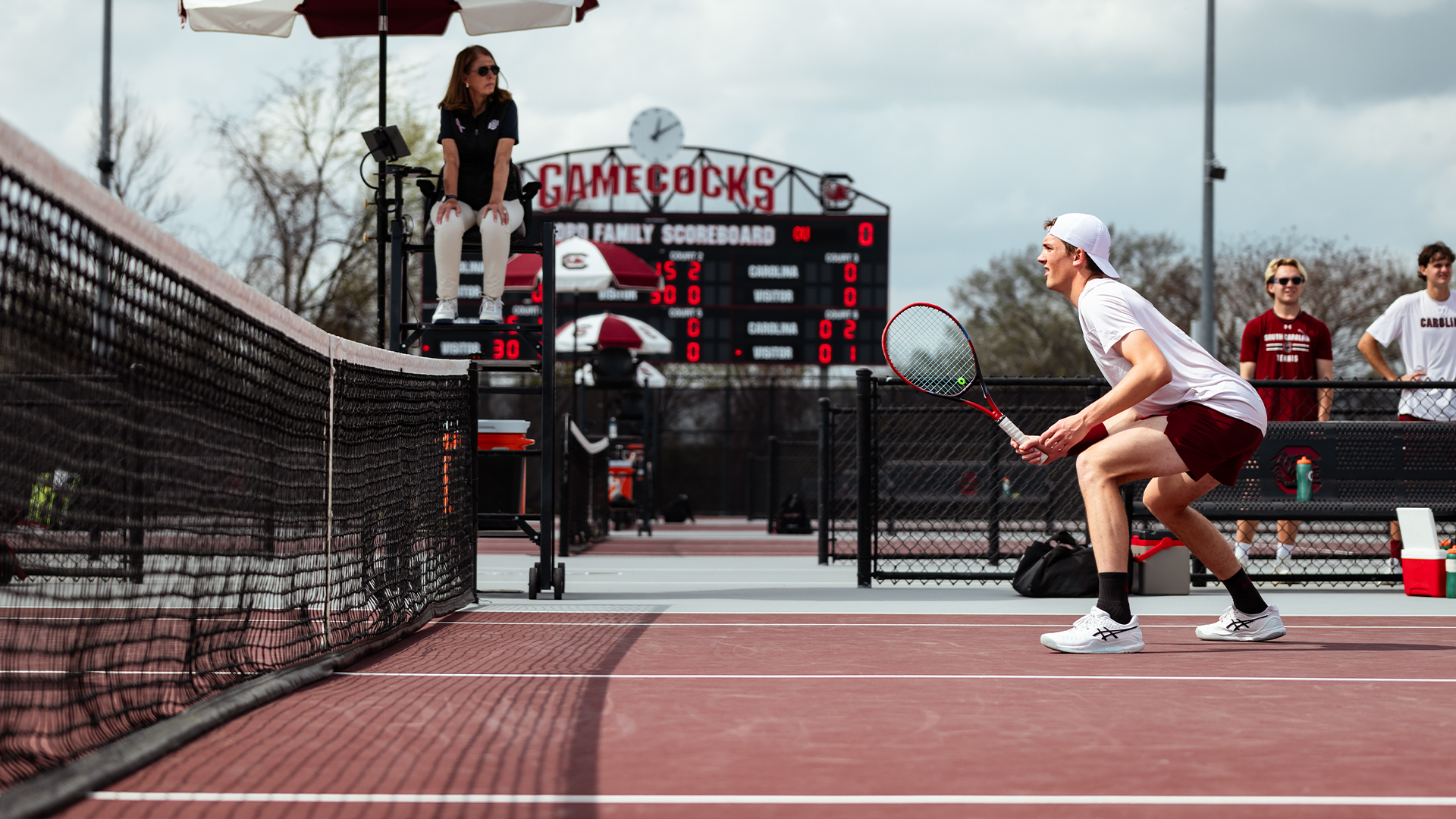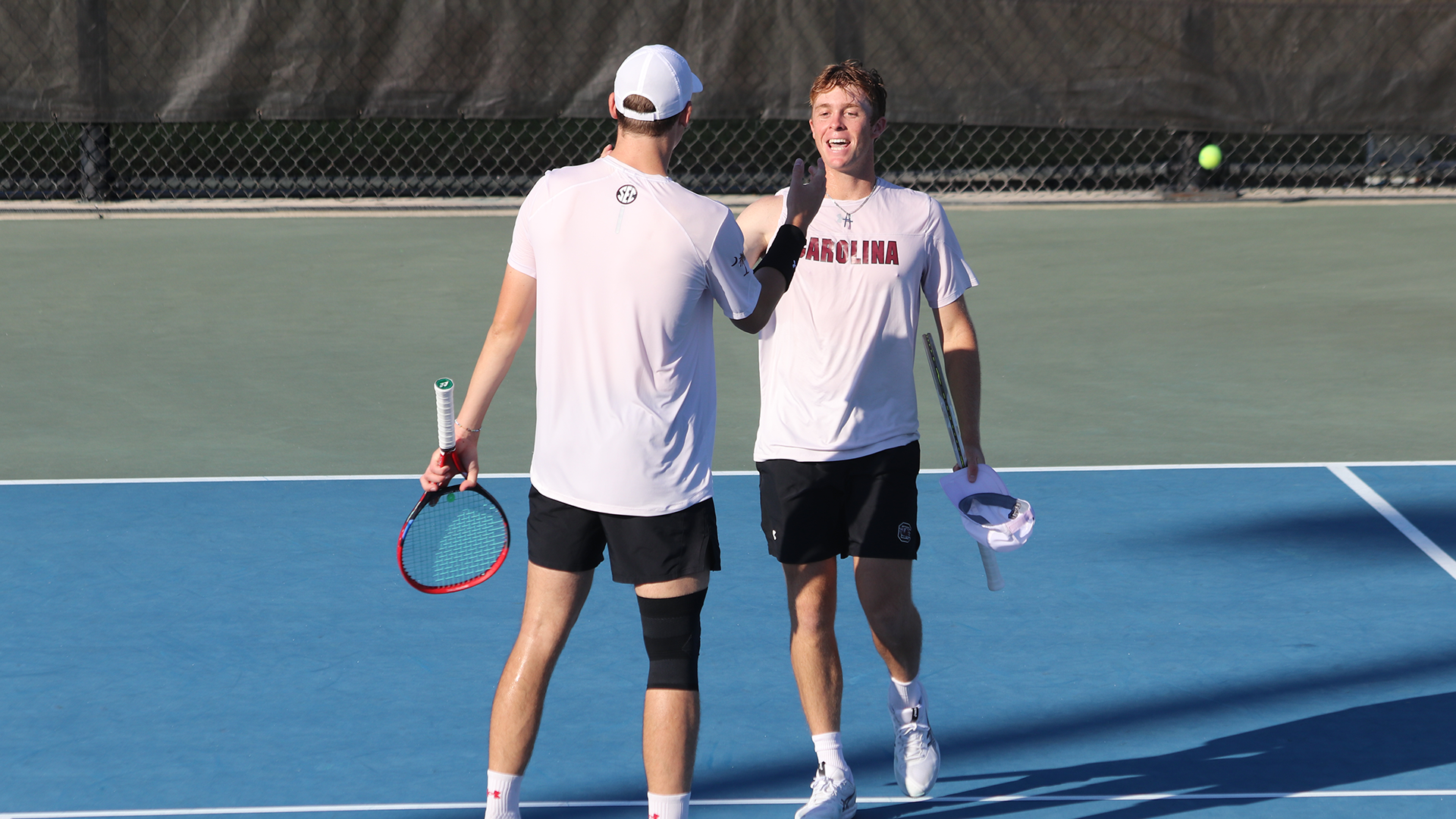
Gamecocks Earn Competitive Edge Through Psychology
Jan. 26, 2016

It’s no secret that psychology can play an important role in the heat of athletics competition. For South Carolina men’s tennis coach Josh Goffi, mental exercise training can be just as important as working on a backhand, forehand or serve. The purpose of these exercises is to give his team a better understanding of the game, as well as a mental edge over their opponents.

“What we try to do every day is not to strive to play our best every time because that’s holding a standard you really can’t accomplish,” Goffi said. “If you’re trying to be great every day in a sense that you have to be perfect in order to win, the pressure you will feel going on to the court is so immense that you end up crumbling.”
Whether it’s seeking “the hidden score,” remaining “positive neutral,” showing the ability to “keep your thumb on top,” or simply “starting the clock,” Goffi has applied what he learned growing up under his father (Carlos Goffi), a renowned professional coach, as well as from his college and professional playing experiences to shape his psychological coaching style.
“Every day, every word that is coming out of my mouth is embodying all of that,” Goffi said. “Our individual time on the court is very skill-oriented, developing each player’s skill, but team practices are all about competing. So it involves all of that. There are classroom sessions we have about that. With the freshmen, we bring them in for one-on-ones and go slow with them so they get the general idea. Then we watch a video and that’s when it’s really apparent to everybody, and they start learning and applying it on the court.”
“It was nothing I had ever heard before,” said junior Andrew Schafer. “It’s definitely a lot different than what my junior tennis coaches taught me, which was primarily strokes and fitness. He (Goffi) is really touching the mental side of the game. It gives us such an advantage over our opponents because they don’t get this kind of mental training.”
“We call his talks `Goffiing,’ ” added redshirt sophomore Thomas Mayronne. “We tell the new guys, he’s going to `Goffi’ you. It takes a while sometimes for the freshmen to get a handle on it, but it’s good.”
Finding the Hidden Score
Tennis has its own unique scoring system for each game, but Goffi noted that the match or game score can be misleading.
“A lot of times, especially for a young player, the match or game score governs their emotions throughout a match, and it absolutely shouldn’t,” Goffi said. “All the actual score is giving you is just a new situation in the match, and then it’s how you appropriately react to that.”
The reaction comes from what’s happening in what he calls the “hidden score.”
“It’s how many points I have strung together in a row,” Goffi said. “For instance, I can be down in a match 4-1, yet I’ve just tracked four points in a row and I’m at deuce in the next game. I could have won seven of the last ten points, and that’s a lot of momentum coming my way even though I’m down 4-1.
“Now there is a major landslide of momentum heading in that one direction. So we are always looking for ways to create momentum in the hidden score log throughout a match. When we are ahead, we need to continue that momentum. So we play according to the score as well as to the hidden score.”
Sounds good in theory, but the proof is in the results.
“Last fall, I lost the first set in a tournament, but Coach Goffi kept telling me to stick with the game plan,” Schafer said. “So I did, and I slowly began to break my opponent down. I started winning a couple of points in a row, and I saw a little chip in the armor. So I took advantage of that and won the match in three sets.”
“It’s a lot about the hidden score, and it’s a lot about body language and energy,” Mayronne said. “It’s about learning how to compete. I believe in it completely. You have to experience it yourself before you really buy into it, but it has really paid off for me.”
A lot of it is creating a stress across the net that makes him implode, and that is our sole goal when we come out.
Josh Goffi
Positive-Neutral vs. Neutral-Negative
Staying positive in any competition can be easier said than done, but Goffi said it’s something that is completely controllable each time a player walks on to the court. He refers to maintaining “positive-neutral” as a gold standard.
“The positive-neutral standard is, for every good thing I do, I need to give myself positive reinforcement, and for every bad thing I do, I need to cancel out a negative with a positive to make it a neutral,” Goffi explained. “Therefore, I am always keeping my subconscious mind moving in the right direction.”
“They help a lot,” Schafer said. “It just keeps us more focused on the match. It keeps us headed in the right direction.”
Goffi contends that the subconscious mind tends to be very self-critical, which for some individuals may result is a cascade of negative thoughts.
“Without even knowing it, it’s telling you that you are terrible when you do something wrong,” Goffi said. “When you do something right, it’s telling you `Of course, you should have done it that way.’ It’s a very neutral-negative mentality, and we need to create in the conscious thought, a positive-neutral mentality to cancel it out.”
The ability to do that will help a player to continually get better throughout a match and remain open-minded to changes.
“He can see what’s happening across the net very clearly,” Goffi said. “When he’s in a neutral-negative state, all he’s doing is running in a negative trend and he will be out of the match just like that.”
That’s pretty heavy stuff for an 18-22 year-old, right?
“It is heavy, and they buck it hard because they have never looked at tennis that way before,” Goffi said. “They’re all very talented coming in and very good athletes. Once they become aware of it on the court, then it turns into them actually doing it.”
Thumb on Top and Starting the Clock
The aforementioned psychological exercises are meant to keep an individual mentally strong during the stress of a match. The end-game is to make sure that you are the one controlling the match by mentally keeping your thumb on top of your opponents and “reaching across the net to feel your opponent’s pulse.”
Put simply, the key is ensuring that the opponent cannot play to his own strengths at all times, thereby forcing him to make mental or unforced mistakes.
“You keep him under your thumb so he can’t get out and become a monster,” Goffi said. “He can’t grow. That’s part of reaching across the net and feeling a guy’s pulse. It’s very mano-y-mano type stuff. It’s basically a battle between two guys out here. Everybody’s skill set is essentially equal. It’s a matter of who is going to be able to out-compete or get on top of the other guy and not let him up. A lot of it is creating a stress across the net that makes him implode, and that is our sole goal when we come out.”
I believe in it completely. You have to experience it yourself before you really buy into it, but it has really paid off for me.
Thomas Mayronne
These are lessons Goffi learned from his mentors.
“A lot of this came from my father and later my college coach, Chuck Kriese, who was great as far a running a straightforward style of momentum tactics that are based on the score,” Goffi said. “Mixing that with a lot of subconscious mind/mentality books helped formulate the positive-neutral mentality and some other things that go along with it.”
Goffi compares these tactics to infusing poison into an opponent’s game and that all feeds into what he calls “starting the clock.”
“For the best teams, it takes about an hour and half to start seeing anything going wrong with the guy across the net,” Goffi said. “The weakest team will take about twenty minutes. It gives our guys a barometer of what they should be looking for on the court.
“It’s not about us. Tennis tends to be so internal, but everything needs to be external. We need to take care of ourselves, but then we need to start the clock. Starting the clock is imposing my will on you as my opponent, and then it’s just a matter of time until it is going to `take.’ “
Tennis anyone?












